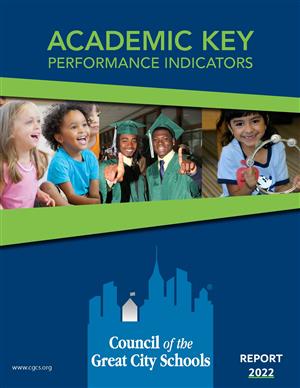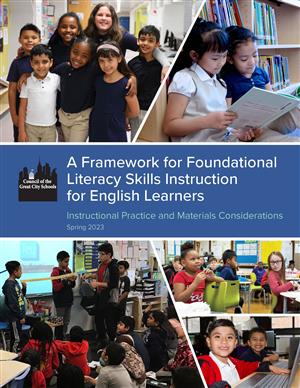- Council of the Great City Schools
- Council Releases New Reports
Digital Urban Educator - October 2023
Page Navigation
- 'Urban Educator of the Year’ Honors Go to...!
- Council Aims to Amplify Student Voices at Town Hall Meeting
- Toledo Superintendent Reflects on Decade at the Helm of Hometown District
- Influential Philadelphia Educator and Council Leader Remembered
- Q&A Document on Role of Race in College Admissions Applications
- Council Releases New Reports
- 2023 Blue Ribbon Schools Named
Council Releases New Reports
-
The Council of the Great City Schools recently released new reports focusing on AI technology, urban student achievement, academic performance indicators and operational management, curriculum, and English learners in the nation’s big-city school districts.
Launched in collaboration with the Consortium for School Networking (CoSN), the K-12 Generative Artificial Intelligence (Gen AI) Readiness Checklist is a comprehensive resource to aid school districts in responsible integration of Gen AI technology.
Gen AI has the potential to revolutionize education, but its successful implementation requires careful planning and consideration of various factors. The K-12 Gen AI Readiness Checklist offers a curated list of questions to help district leaders devise implementation strategies across six core focus areas: Executive Leadership, Operations, Data, Technology, Security, and Risk Management.
Supported by Amazon Web Services, the resource focuses on ensuring that Gen AI solutions are free from bias or algorithmic discrimination, protect data privacy, and have a clear understanding of the sources of generated information.
“By simply blocking the use of Gen AI, districts are unintentionally widening the gap between those who have personal access to this tech outside of school and those who do not,” said Council Executive Director Ray Hart. “We know the future will include Gen AI in many forms and functions, and we have a responsibility to prepare students for that future. By creating this checklist, we hope to provide awareness and understanding among K-12 leaders of how they can safely implement Gen AI so every student can learn how to use this transformative technology.”
Between the Lines, Large City Performance on NAEP Over the Last 20 Years (2002-2022) looks at data from the National Assessment of Educational Progress (NAEP) to understand differences in student performance between large cities and students nationally over the last 20 years, including after the effect of the COVID-19 pandemic.
The report found that the gap between student performance in large cities and students nationally has been steadily shrinking and that urban schools have been demonstrating growth and progress over the last 20 years. In addition, Large City schools appear to have staved off the deep declines in test scores to such a degree that any progress that had been made in closing achievement gaps between cities and public schools across the country was preserved. One area of concern from this analysis is outcomes on fourth grade mathematics assessments, which experienced a significant increase in the gap in performance between students in Large City schools and those of public-school students nationwide. These fourth-grade mathematics results should give educators and decisionmakers pause and inspire conversation to get Large City students back on track to close achievement gaps in this area. The report concluded that if policymakers continue to invest in urban school systems, the gap in performance between students in large cities and students nationally could continue on its historical course toward closure.
Academic Key Performance Indicators, 2023 gives urban school districts a performance benchmark to compare their academic growth against the progress of others.
 The report presents different ways that Council districts can use data to disaggregate results, show trends and combine variables in analyzing academic performance in such areas as pre-K and kindergarten enrollment, algebra I completion rates, absentee rates by grade level, and Advanced Placement participation rates.
The report presents different ways that Council districts can use data to disaggregate results, show trends and combine variables in analyzing academic performance in such areas as pre-K and kindergarten enrollment, algebra I completion rates, absentee rates by grade level, and Advanced Placement participation rates.Managing for Results in America’s Great City Schools 2023 is an update of the Council’s annual report on performance measures that could be used to improve business operations in urban school districts, such as procurement, information technology, budget and finance and other business and management services.
Supporting Excellence: A Framework for Developing, Implementing, and Sustaining a High-Quality District Curriculum The second edition of this publication is designed to help districts: determine the quality and alignment of curriculum guidance to clarify the district’s learning expectations at each grade-level with a focus on student assets and diverse learners; ensure that curriculum guidance includes appropriate scaffolding and support for English language learners, students with disabilities, and historically marginalized students that is rigorous and aligned to district standards; and provide support in the district’s curriculum guidance for addressing unfinished learning during Tier I instruction that also attends to the social, emotional, and well-being of students.
A Framework for Foundational Literacy Skills Instruction for English Learners: Instructional Practice and Materials Considerations English learners (ELs) need a
 comprehensive and connected approach to foundational literacy skills development that involves grade-level instruction by teachers who build on the linguistic repertoire of ELs, teaching how the English language system works to convey meaning. This document rethinks English foundational skills instruction—explicating the research, explaining what teachers should know, and providing considerations for designing and selecting instructional materials.
comprehensive and connected approach to foundational literacy skills development that involves grade-level instruction by teachers who build on the linguistic repertoire of ELs, teaching how the English language system works to convey meaning. This document rethinks English foundational skills instruction—explicating the research, explaining what teachers should know, and providing considerations for designing and selecting instructional materials.Great City Schools Step Up to Meet the Needs of Refugee Children In May of 2022, the Council of the Great City Schools brought together bilingual directors, educators, and staff from big-city member districts and invited them to share the work they had done and continue to do on behalf of newcomers and refugee students and their families. In addition to providing newcomer aid, instruction, and social services to the new arrivals, attendees reported helping families find housing and coordinating community services.
District Considerations for Universal Dyslexia Screening: Ensuring Appropriate Implementation and Instruction for English Learners The purpose of this brief is to share potential challenges regarding the implementation of universal dyslexia screening for English learners (ELs) and highlight considerations that ensure English learners are appropriately screened given their language development trajectory and the foundational literacy instruction ELs have received. The brief also offers considerations for the appropriate interpretation and use of screener results when districts are required to universally screen for dyslexia, including for students who have limited oral language development and little to no knowledge of English phonemes (e.g., when sound/letter correspondence differs between languages with different writing systems).
Media Contact:
Contact Name
Contact@email.com
(000) 000-0000
Contact Name
Contact@email.com
(000) 000-0000
Contact Name
Contact@email.com
(000) 000-0000
Media Contact:
Contact Name
Contact@email.com
(000) 000-0000
Contact Name
Contact@email.com
(000) 000-0000
Contact Name
Contact@email.com
(000) 000-0000


